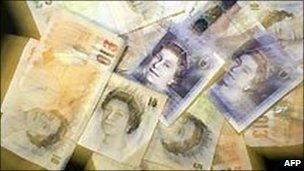Higher tax rate to hit 750,000 more people, says IFS
- Published

The IFS estimates the average household will be £200 worse off
Three-quarters of a million more people are set to become higher-rate taxpayers in April, according to a leading economic research body.
The Institute for Fiscal Studies (IFS) estimates the average household will be £200 a year worse off as a result of tax rises and benefit cuts taking effect on 5 April.
At present there are more than 30 million income tax payers in the UK.
Some 500,000 people will no longer pay income tax owing to the changes.
This is because the point at which any income tax starts to be paid - known as the personal allowance - will rise.
Winners
The IFS report explains that the pattern of gains and losses as a result of the tax reforms is complex.
It concludes that the main winners from the 2011 tax changes will be lone parents who are not working, and low-to-middle income households without children.
This is owing to the rise in the personal allowance, and rises in the child element of Child Tax Credit.
From the start of the next tax year, the government is also increasing the main rate at which National Insurance is charged.
As a result of these changes, an individual earning £7,475 a year will pay £275 a year less in income tax and National Insurance.
Those earning up to about £35,000 a year will also be better off owing to the changes being introduced in April, though to a lesser degree as this income rises, according to the report.
Losers
The threshold for the higher-rate 40% income tax rate will be £35,001 of taxable income from April, compared with £37,401 this financial year.
Taking into account the personal allowance, individuals will start to see their income tax and National Insurance payments increase sharply when their earnings rise above £42,475.

The biggest losers are the very richest households owing to restrictions on the amount that can be contributed to a private pension.
They have also been affected by the 50% income tax rate on earnings above £150,000 and withdrawal of the income tax personal allowance above £100,000 that were introduced in April 2010.
For every £2 earned above £100,000, £1 of the personal allowance is lost.
The removal of that allowance means that betwen £100,000 and £114,950, earnings attract a marginal tax rate of 60%.
The report adds that working couples with children will lose significantly from cuts to tax credits.
James Browne, a senior research economist at the IFS who wrote the report, said: "Further reductions in household income are inevitable as government policies aimed at helping to reduce government borrowing from its post-World War II high are introduced.
"The set of the changes coming in April is complex and the pattern of gains and losses reflects this."
A Treasury spokesman said: "Stable, balanced public finances benefit everyone as they create the right conditions for growth and help keep interest rates down. The government have had to make tough choices but have always been clear that those with the broadest shoulders should carry the greatest burden.
"It is a matter of fairness. We cannot justify taxing the poorest to pay benefits such as tax credits and child benefit to higher earners. The changes to be made in April mean that tax credits will be targeted at those who need them most."
He said that the shift of people into the higher tax bracket was an accumulation of measures from the previous administration and this government. The Treasury's own estimate was of 650,000 more people becoming higher rate taxpayers.
Future changes
More changes are also planned for subsequent years.
Child benefit is set to be withdrawn for higher rate taxpayers from April 2013.

Working couples with children are losing out, the report says
"If the government were to meet its aspiration of having a £10,000 income tax personal allowance in 2015-16, this would increase the number of higher rate taxpayers by a further 850,000 and take another million people out of income tax altogether," the report added.
At the weekend, Chancellor George Osborne told the BBC he had to make hard economic decisions.
Speaking to the Politics Show on Sunday Mr Osborne said no politician liked cutting spending and increasing taxes, but he was trying to clear up the "mess" Labour had left.
He added: "I feel every day a huge responsibility to get these decisions right for Britain."